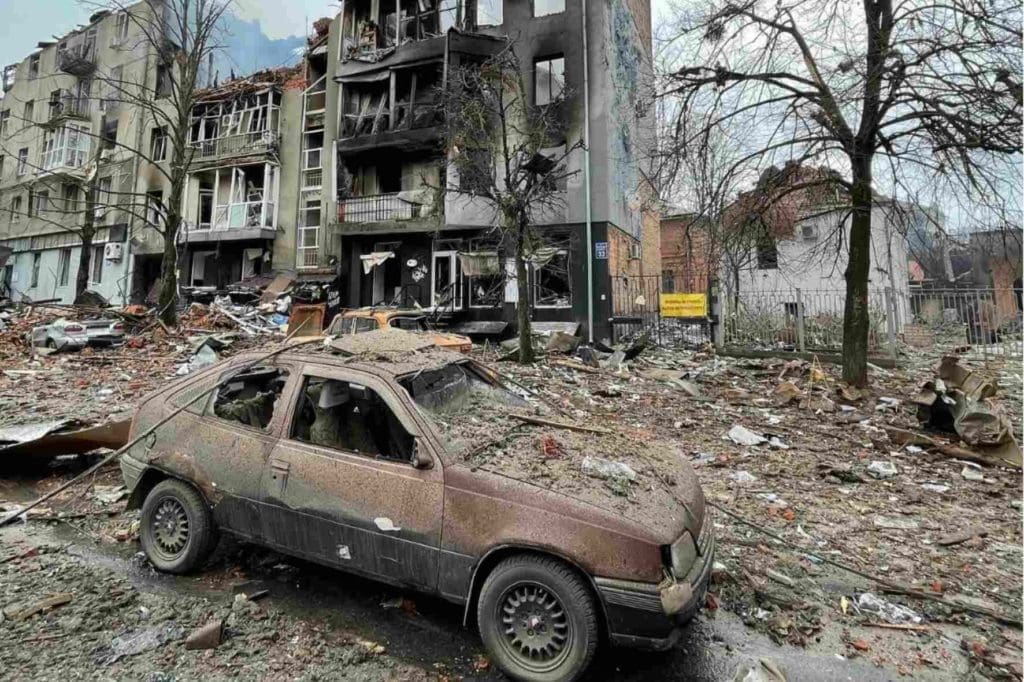For people living in Ukraine, life changed overnight with the Russian invasion and their normal lives were suddenly put on pause as the country found itself at war. Guest writer Katie Ham talks to a CEO turned war photographer living in Kharkiv, capturing the atrocities going on around him.
“[Four] weeks ago our normal day was to wake up, go to the gym, go to work, see our friends or loved ones,” Iurii Kochubey tells me, from his home in Kharkiv, one of the worst-hit cities in Ukraine. “We had plans. We planned our vacations. We planned where we would go for the weekend. But on February 24th at 5am everything changed. Now we just hope we live through the day”.
Just over a month ago, Iurii, 33, was the CEO of a camera rental company. He spent his days recording the celebrations in people’s lives. Now, Iurii travels around Kharkiv taking photographs of the damage done by the Russian bombardment in the hope that one day they will be shown in a world court as evidence of the war crimes currently taking place in Ukraine.

Arming himself with his camera, Iurii spends his days driving around Kharkiv, documenting the atrocities inflicted on Ukrainian citizens. He is determined to show the world what is really happening in Ukraine, at all costs. On the day of our call, our interview is delayed for two hours because of the particularly heavy bombing that evening. “Another air raid… sitting in hiding,” he messaged.
When we do eventually manage to speak, Iurii is huddled in a bomb shelter in the dark. He is still wearing his hat and coat, camouflaged in the beige protective clothing the military had given him.
“Four weeks ago we had normal lives, like I imagine you do in New Zealand, but now we spend our days in a bomb shelter.”
Sitting next to Iurii was a translator he’d found for us – Olena, a 31-year-old customer services manager. Iurii warns me that his English was “not fluent enough to discuss such an important topic.” His photographs, however, transcend all language barriers.
“Can you hear that?” Iurii asked as soon as the video call clicked on, with the sounds of planes flying overhead audible in the background. “We hope it’s the Ukrainian military fighting back… but at this point we can’t even tell,” he says. There was a small window near the ceiling to which Iurii’s eyes darted each time there is another explosion. His fear was palpable.
He doesn’t know what day of the week it is anymore; like so many Ukrainians, he just thinks in terms of days since the invasion – Day 14, Day 21, Day 30 – and even then he is losing track.
Iurii has lived in Kharkiv since 2007, and Olena her whole life. This is their home, they try to emphasise. “[Four] weeks ago we had normal lives, like I imagine you do in New Zealand, but now we spend our days in a bomb shelter,” Iurii says.
Although most of Iurii’s friends fled Kharkiv in the early days of the invasion, Iurii resolved to stay. He would be “no good” at fighting, he said, but there is one thing he knows he can do to help: document the truth.
But even his photographs “cannot translate the horror and shock of what has happened to our city,” he says. Bodies – children among them – lie stacked on street corners, relying on the below freezing temperatures to stop the smell becoming too much for those who have somehow managed to avoid a similar fate. If it is just the parts of a dead person, the police do what they can to gather the pieces into a body bag.
“After you see all that, you will probably never be able to be normal again… something changes in your psychology at that point.”
Having a task to do during the day is helping; it’s the only thing that can take his mind off the war around him. But at night there are no distractions. At 6pm, a government-mandated curfew begins, and doesn’t end until 6am. It is too dangerous to be on the streets. During this time all Iurii can do is listen to the noises outside and try to figure out what is happening.
“After you see all that, you will probably never be able to be normal again… something changes in your psychology at that point,” Iurii explains. When not photographing the devastation caused by the constant bombardment, Iurii does everything he can to help those around him by way of humanitarian aid. Some days he delivers food and medicine to those most in need, others he sorts through the clothes of dead soldiers in an attempt to find any without blood that can be re-used by the Ukrainian military.
So what can we – so far away – do to help? “Just spread the word. It’s important for us that the world knows the truth,” Iurii says. As our conversation winds up, I notice how tired Iurii looks. He can barely keep his eyes open.
“When the war is over we would really like to visit New Zealand!” Olena laughs, breaking away from her role as translator.
“Yes! Please do! … It’s the most beautiful country,” I reply.
“We used to have a beautiful country too, you know. Just four weeks ago, it was beautiful,” Olena says.

